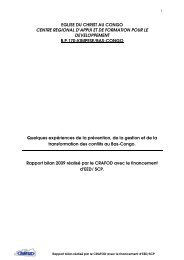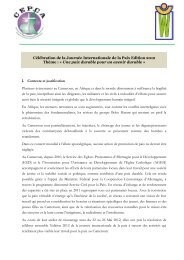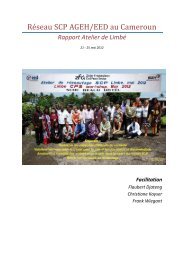- Page 1:
Peacebuilding& conflict transformat
- Page 5 and 6:
Peacebuilding& conflict transformat
- Page 7 and 8:
Table of contentsEditors’ Forewor
- Page 9 and 10:
2.1 Aspects of conflicts . . . . .
- Page 11 and 12:
Editors’ forewordWhen Katharina S
- Page 13 and 14:
ForewordDear user(s), this resource
- Page 15 and 16:
This version is accompanied by the
- Page 17 and 18:
process our social connectedness as
- Page 19 and 20:
I.PEACE
- Page 21 and 22: Peace and striving for peace are at
- Page 23 and 24: ▶ Peace is an interweaving of rel
- Page 25 and 26: peace encompasses all aspects of a
- Page 27 and 28: 1.5 Strategies for peaceMahatma Gan
- Page 29 and 30: ▶ International Convention on the
- Page 31 and 32: There is a great deal of human suff
- Page 33 and 34: 2.2 Principles for peacebuildingThe
- Page 35 and 36: InfrastructureInfrastructure is req
- Page 37 and 38: ebuilding community structures, per
- Page 39 and 40: 3.1 What is peace education?Peace e
- Page 41 and 42: NonviolenceNonviolence means that f
- Page 43 and 44: the fear of the one’s personal po
- Page 45 and 46: ▶ Discover inner peace —this me
- Page 47 and 48: 4.1.2 Peace as a research activity
- Page 49 and 50: II.COMMUNICATION
- Page 51 and 52: 2. Facts about communication2.1 It
- Page 53 and 54: 2.5 Implicit and explicit messagesA
- Page 55 and 56: 2.7 Our own fantasySometimes one re
- Page 57 and 58: 3.1 Verbal communication“Speech i
- Page 59 and 60: Facial expressions: show emotions o
- Page 61 and 62: Smelling using the nose to listen t
- Page 63 and 64: Intrapersonal communication … is
- Page 65 and 66: 7. Receiving and sending7.1 The cyc
- Page 67 and 68: All four aspects must be properly r
- Page 69 and 70: Dimension of information/factual le
- Page 71: Additionally, a receiver whose self
- Page 75 and 76: the listener is expected to clearly
- Page 77 and 78: Set context and state the purpose o
- Page 79 and 80: Keep in mind:▶ When overused, act
- Page 81 and 82: Don’t say “You know something w
- Page 83 and 84: 10.1.3 SummarizingA summary is simi
- Page 85 and 86: ClarifyingClarifying means to use t
- Page 87 and 88: Questioning techniques / Interrogat
- Page 89 and 90: Obviously, before even thinking of
- Page 91 and 92: Helpful - de-escalating effectExpre
- Page 93: Additionally, people actively invol
- Page 96 and 97: 1. Conflict - a fact of lifeSymbol
- Page 98 and 99: 2. Social conflict2.1 What is typic
- Page 100 and 101: Examples▶ Two people disagree on
- Page 102 and 103: 2.3 Typical conflict behavioursThe
- Page 104 and 105: conflict transformation skills as i
- Page 106 and 107: AttitudeAttitude means the way an i
- Page 108 and 109: Respect: self‐respect, personal i
- Page 110 and 111: acquired by everyone. If dialogue a
- Page 112 and 113: Sources of powerThere are various s
- Page 114 and 115: . Needs and their classificationsHu
- Page 116 and 117: or any other differentiating charac
- Page 118 and 119: How we are likely to feel when our
- Page 120 and 121: Structural conflict is caused by un
- Page 123 and 124:
IV.TOOLS FORANALYSIS
- Page 125 and 126:
Context analysis in peace building
- Page 127 and 128:
Conflict analysis can be carried ou
- Page 129 and 130:
a) good conflict analysis skills,b)
- Page 131 and 132:
Decide and agree on the meaning of
- Page 133 and 134:
Example - Age limit for CYF members
- Page 135 and 136:
3.4 ABC - triangleWhat is it?▶ Th
- Page 137 and 138:
When to use it?▶ with a group hav
- Page 139 and 140:
3.7 Pyramid - three level triangleW
- Page 141:
▶ Relationship: identify and desc
- Page 144 and 145:
1. IntroductionViolence is a phenom
- Page 146 and 147:
▶ Worldwide, violence is used as
- Page 148 and 149:
Core of use of objects (weapons)Vis
- Page 150 and 151:
4. Dimensions of violence - a typol
- Page 152 and 153:
▶ Direct violence means an indivi
- Page 154 and 155:
using industrialized nations cause
- Page 156 and 157:
tual condition compared to what wou
- Page 158 and 159:
6. The dynamics of conflicts and vi
- Page 160 and 161:
Survival or physical level - The in
- Page 162 and 163:
6.1.2 Aggression and…Aggression a
- Page 164 and 165:
▶ One can use so‐called ‘invi
- Page 166 and 167:
tooth” are common all over the wo
- Page 168 and 169:
6.3.1 From unmet needs to crisis -
- Page 170 and 171:
Fire begins to burnConfrontation/Op
- Page 172 and 173:
6.3.4 F. Glasl’s - nine stages of
- Page 174 and 175:
3. LEVEL THREE (LOSE-LOSE)Stage 7:
- Page 176 and 177:
to describe emotions or speak about
- Page 178 and 179:
eaction and answer concerning the d
- Page 180 and 181:
7.3 Violence and genderSEXrefers on
- Page 182 and 183:
Gender based violenceGender based v
- Page 184 and 185:
7.5 Violence and ideology▶ Nation
- Page 186 and 187:
with equal alacrity by people on th
- Page 188 and 189:
9. Effects of violenceViolent confl
- Page 191 and 192:
VI.NONVIOLENCE
- Page 193 and 194:
2. Historical roots2.1 ReligionNonv
- Page 195 and 196:
Mahatma Gandhi was born a Hindu, pr
- Page 197 and 198:
colonial and post‐colonial eras.
- Page 199 and 200:
▶ Generations to come will scarce
- Page 201 and 202:
elieve people and not profit are ce
- Page 203 and 204:
Methods of nonviolent protestNonvio
- Page 205 and 206:
Nonviolent communication skills are
- Page 207 and 208:
▶ Mr. A is more concerned about t
- Page 209 and 210:
A kind of misery about one’s own
- Page 211 and 212:
Demand‘I want you to do it, if yo
- Page 213 and 214:
▶ “When I see…” “When I h
- Page 215 and 216:
The following list provides some mo
- Page 217 and 218:
Feelings are often associated with
- Page 219 and 220:
To clearly identify and name our em
- Page 221 and 222:
Fun fulfilled by laughing and playi
- Page 223 and 224:
RequestThe fourth and last componen
- Page 225 and 226:
We help others to trust that we are
- Page 227 and 228:
This involves the four areas of non
- Page 229 and 230:
3) Connect your thoughts with your
- Page 231 and 232:
A verbal wound is as bad as a physi
- Page 233 and 234:
4. Translating the others’ blame
- Page 235 and 236:
VII.FAIR PLAY
- Page 237 and 238:
2. Fairness and sportsAlthough fair
- Page 239 and 240:
▶ Sports can be used to counter v
- Page 241 and 242:
Fair Play PointsIf rules are establ
- Page 243 and 244:
4. Principles for teaching fair pla
- Page 245 and 246:
GangingAn irritating situation can
- Page 247 and 248:
national institutions to send out a
- Page 249 and 250:
VIII.CONFLICTTRANSFORMATION
- Page 251 and 252:
flict is either settled forever or
- Page 253 and 254:
The major aims of dealing construct
- Page 255 and 256:
7. Introducing a third party with s
- Page 257 and 258:
▶ Do not damage your opponent’s
- Page 259 and 260:
2. Conflict strategies -approaches
- Page 261 and 262:
modate put relationships first, ign
- Page 263 and 264:
New ideas are created when working
- Page 265 and 266:
CONFRON TA-TION /COMPETITIONAVOIDAN
- Page 267 and 268:
parency about feelings and percepti
- Page 269 and 270:
Answers to the following questions
- Page 271 and 272:
▶ Interest‐based negotiation is
- Page 273 and 274:
“Blessed be the peacemakers for t
- Page 275 and 276:
They can talk directly (with the me
- Page 277 and 278:
Strength and weaknessA mediator’s
- Page 279 and 280:
5.4 Phases of mediationThe process
- Page 281 and 282:
Ground rulesExplain the ground rule
- Page 283 and 284:
Phase 3 Clarify the problem/develop
- Page 285 and 286:
Deliberate on every optional soluti
- Page 287 and 288:
CHECKLIST FOR MEDIATORSPhase IOpeni
- Page 289 and 290:
APPENDIX
- Page 291 and 292:
15. United Nations: Charter of the
- Page 293 and 294:
6. Lederach, John Paul: Preparing f
- Page 295 and 296:
24. Burton, John: Resolving deep ro
- Page 297 and 298:
24. Dugan, Máire A.: Aggression. B
- Page 299 and 300:
Part VI - Nonviolence1. Wink, Walte
- Page 301 and 302:
5. Sadako Ogata (High Commissioner
- Page 303 and 304:
ReferencesAbiew, Francis Kofi & Kea
- Page 305 and 306:
Foucault, Michael: The History of S
- Page 307 and 308:
Lederach, John Paul: Preparing for
- Page 309 and 310:
Schweitzer, Christine (et al): Civi
- Page 311 and 312:
Gandhi’s principlesLive as if you
- Page 313 and 314:
“I have a dream” - Martin Luthe
- Page 315 and 316:
persecution and staggered by the wi
- Page 317 and 318:
Excerpts from the joint position pa
- Page 319 and 320:
experts and their local colleagues.
- Page 321:
Katharina Schilling is a medical nu









